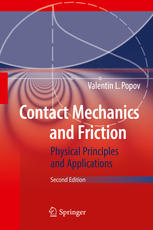

Most ebook files are in PDF format, so you can easily read them using various software such as Foxit Reader or directly on the Google Chrome browser.
Some ebook files are released by publishers in other formats such as .awz, .mobi, .epub, .fb2, etc. You may need to install specific software to read these formats on mobile/PC, such as Calibre.
Please read the tutorial at this link: https://ebookbell.com/faq
We offer FREE conversion to the popular formats you request; however, this may take some time. Therefore, right after payment, please email us, and we will try to provide the service as quickly as possible.
For some exceptional file formats or broken links (if any), please refrain from opening any disputes. Instead, email us first, and we will try to assist within a maximum of 6 hours.
EbookBell Team

5.0
110 reviewsThis application-oriented book introduces readers to the associations and relationships between contact mechanics and friction, providing them with a deeper understanding of tribology. It addresses the related phenomena of contacts, adhesion, capillary forces, friction, lubrication, and wear from a consistent point of view. The author presents (1) methods for rough estimates of tribological quantities, (2) simple and general methods for analytical calculations, and (3) the crossover into numerical simulation methods, the goal being to convey a consistent view of tribological processes at various scales of magnitude (from nanotribology to earthquake research).
The book also explores the system dynamic aspects of tribological systems, such as squeal and its suppression, as well as other types of instabilities and spatial patterns. It includes problems and worked-out solutions for the respective chapters, giving readers ample opportunity to apply the theory to practical situations and to deepen their understanding of the material discussed.The second edition has been extended with a more detailed exposition of elastohydrodynamic lubrication, an updated chapter on numerical simulation methods in contact mechanics, a new section on fretting in the chapter on wear, as well as numerous new exercises and examples, which help to make the book an excellent reference guide.